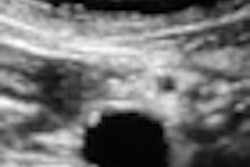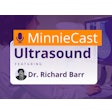CHICAGO - Doppler ultrasound examinations conducted early in the first trimester of pregnancy can identify fetal heart anomalies similar to congestive heart failure in adults -- a defect that might be implicated in 40% of early miscarriages, according to Dr. Jason Birnholz, president of Diagnostic Ultrasound Consultants, Oak Brook, IL.
Birnholz, who discussed his study at a press conference at the 2003 Meeting of the Radiological Society of North America, said Doppler evidence of fetal defects in heart fluid exchange is “98% accurate at predicting early loss, while the absence of this defect predicts that the pregnancy will progress to the fourth month in 99% of pregnancies.”
Following his presentation, Birnholz was peppered with questions from a skeptical audience, many of whom suggested that predicting early spontaneous abortion by Doppler was not yet ready for prime time.
“We have known for some time that a slow heart beat was a bad sign, but we didn’t know why,” said Dr. Julia Fielding, associate professor of radiology, University of North Carolina, Chapel Hill. “What is unique about this study is the use of Doppler to assess the speed of the blood flow, demonstrating diminished flow. This is new since Doppler hasn’t been used this way.”
“The problem is that this is one study, from one investigator, at one center. It needs to be validated by probably two more studies,” she said.
The study included 1800 women who were referred for ultrasound studies before the 10th week of gestation. “Some of these women had symptoms such as bleeding, while others had a history of miscarriage. In other cases it was done just to ease maternal anxiety,” Birnholz said.
At the initial ultrasound, he said, “475 women had no evidence of fetal heartbeat but did have evidence of excess fluid accumulation that was, again, suggestive of fetal congestive heart failure.” Of the 1325 women who had viable fetuses at first examination, 1200 had uneventful pregnancies through the end of the first trimester, the end point of the study.
“One hundred and twenty five fetuses died subsequent to the first exam, all had evidence of heart dysfunction by Doppler,” he said.
Birnholz said that based on these findings he speculates that increasing oxygen supply to the mother could be a therapeutic intervention that might prevent miscarriage, but he added that “is only speculation.”
By Peggy PeckAuntMinnie.com contributing writer
December 2, 2003
Copyright © 2003 AuntMinnie.com



















